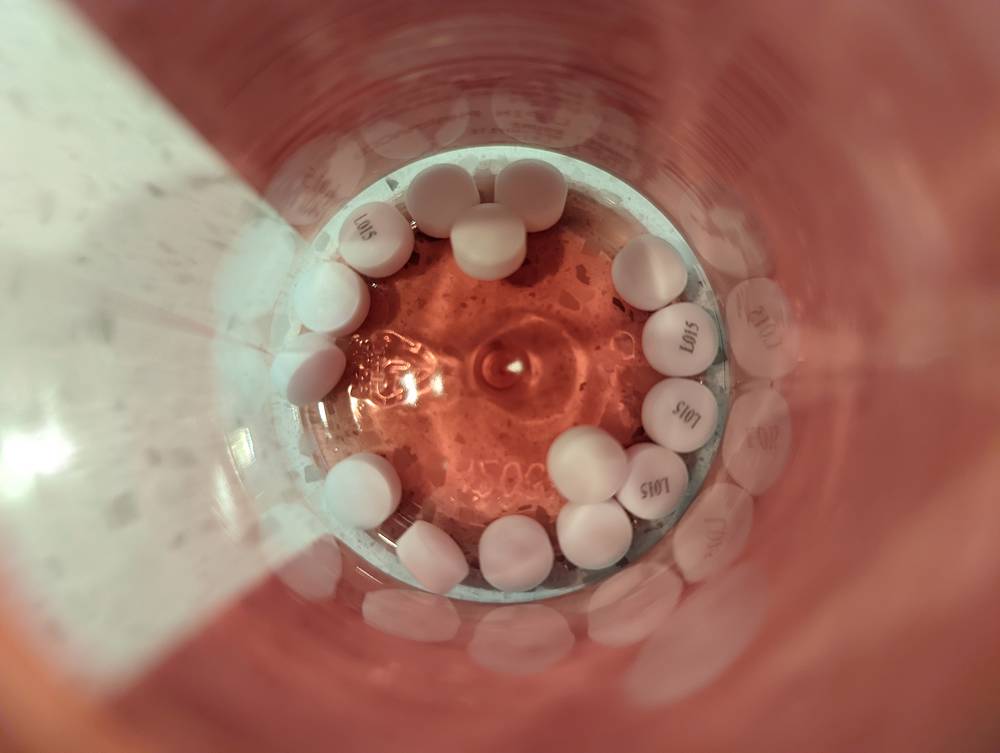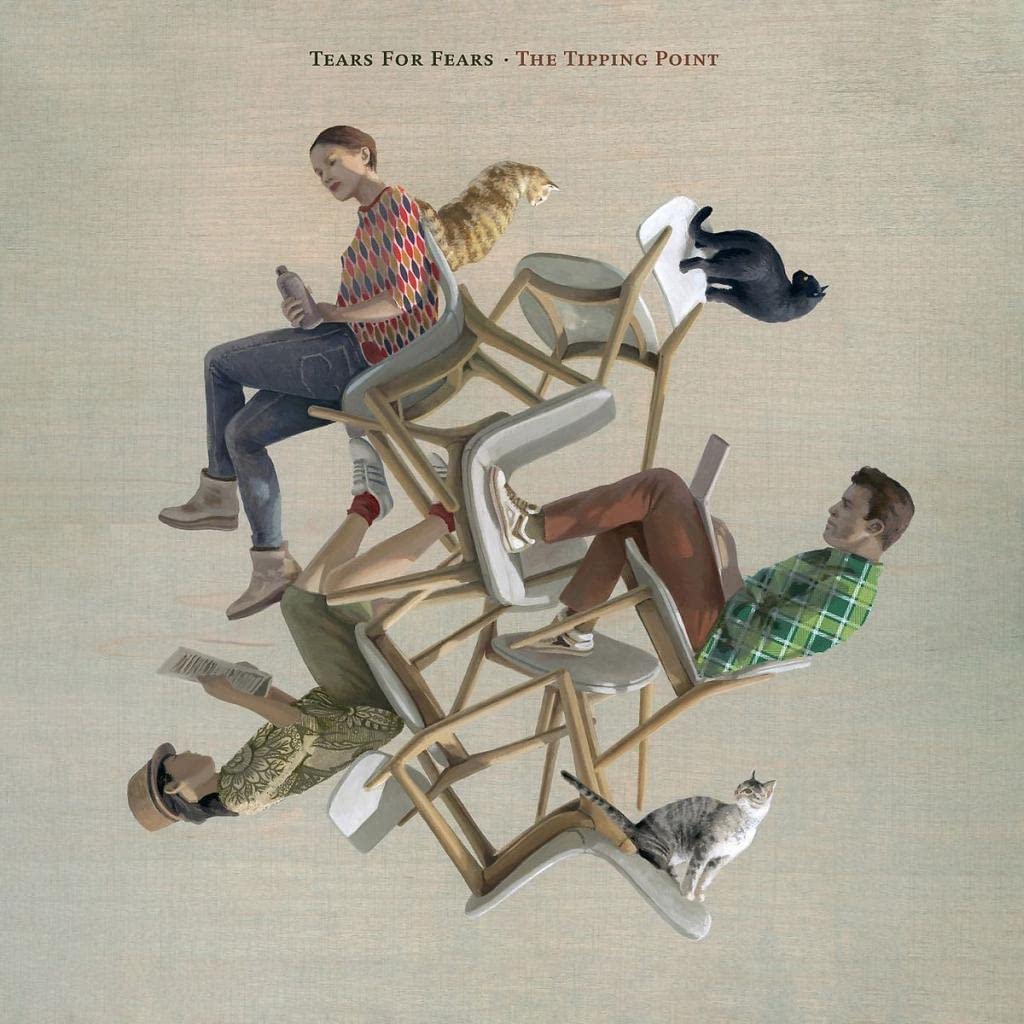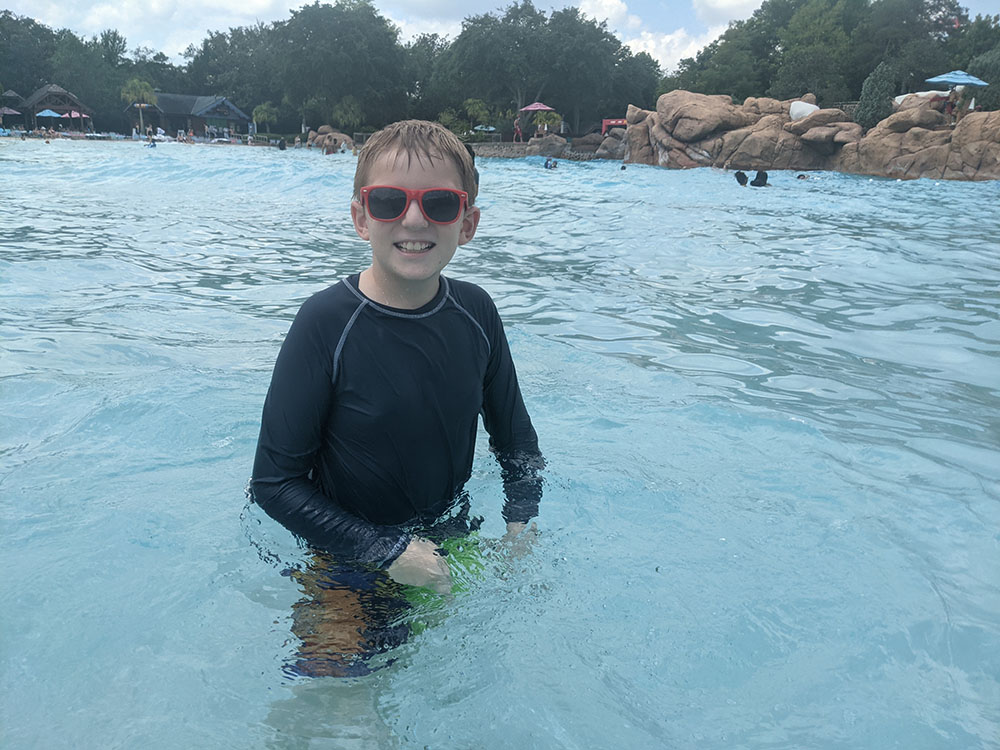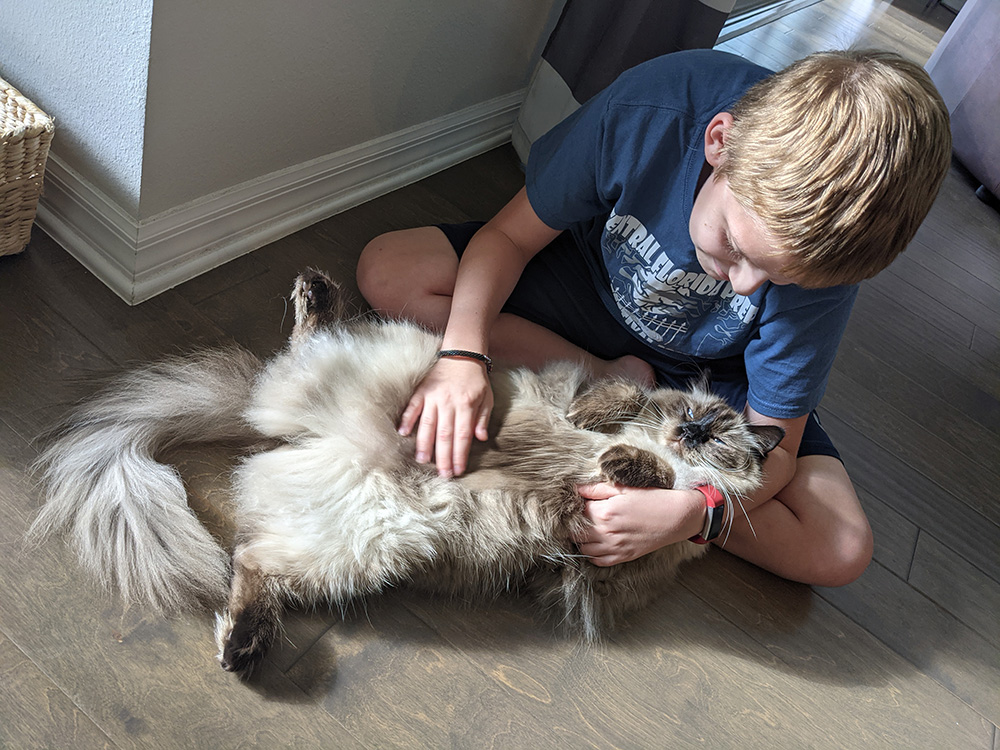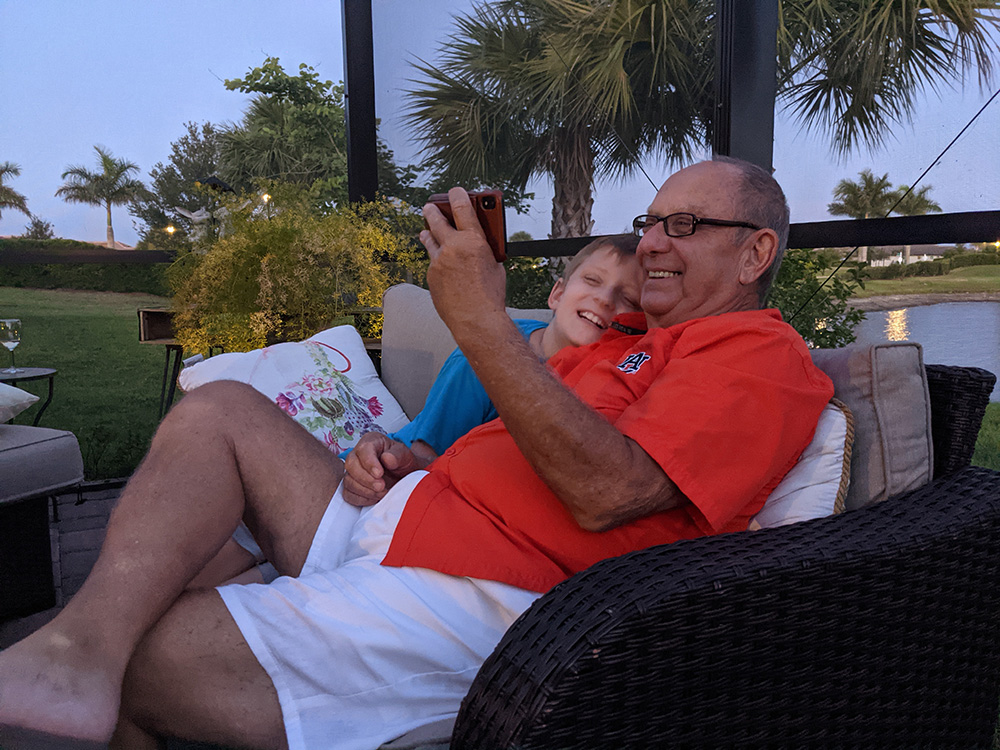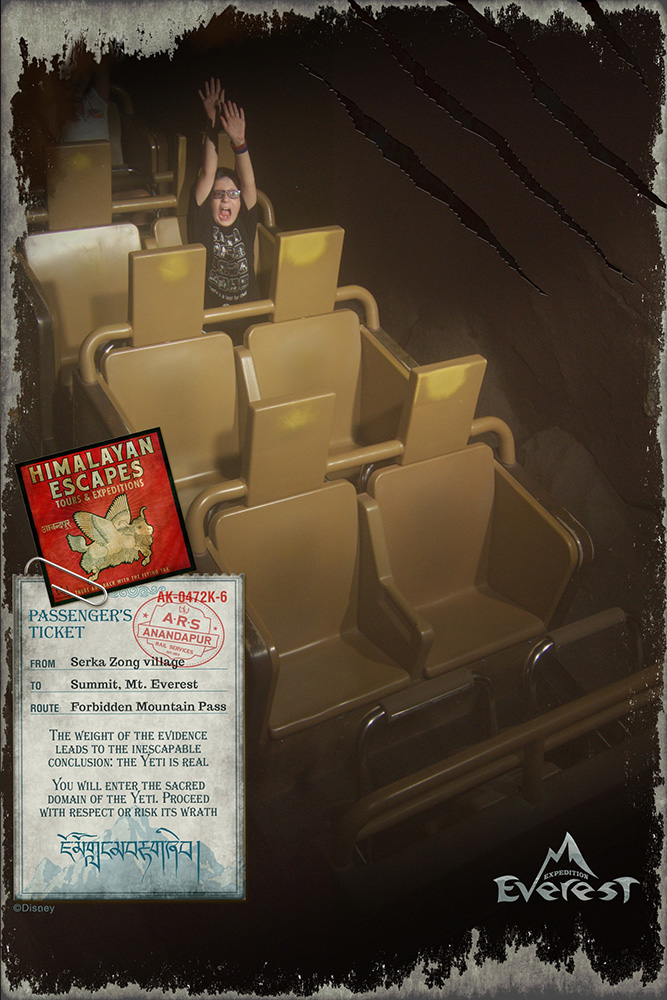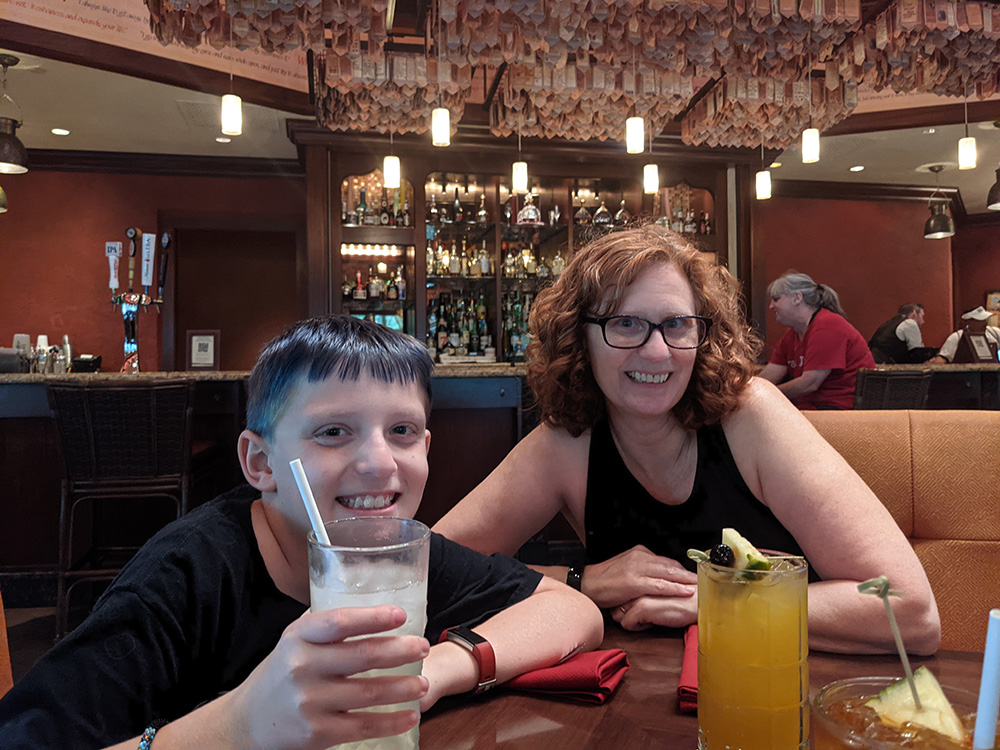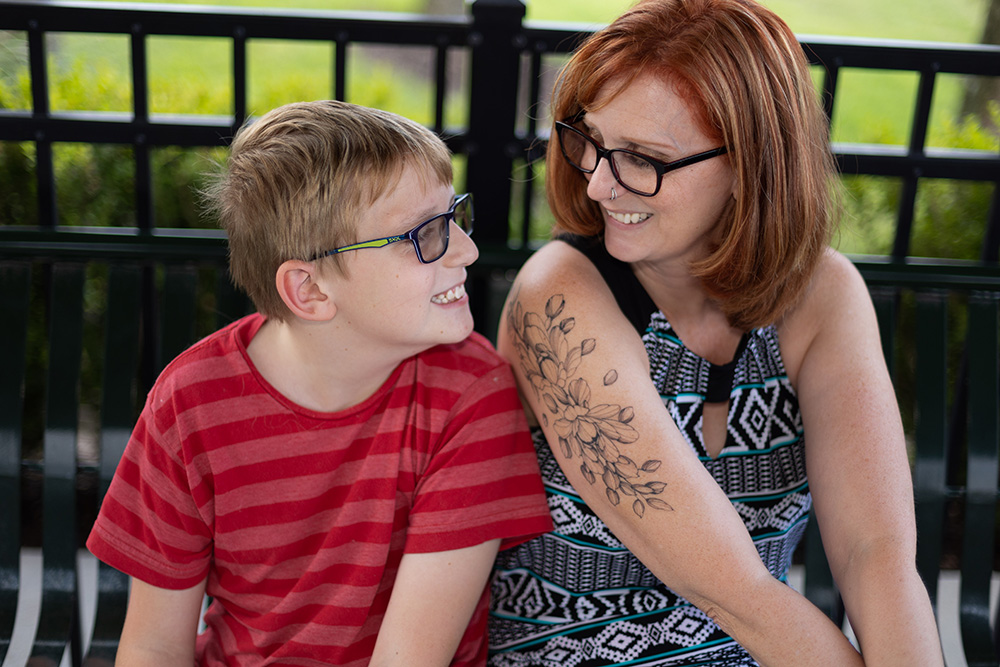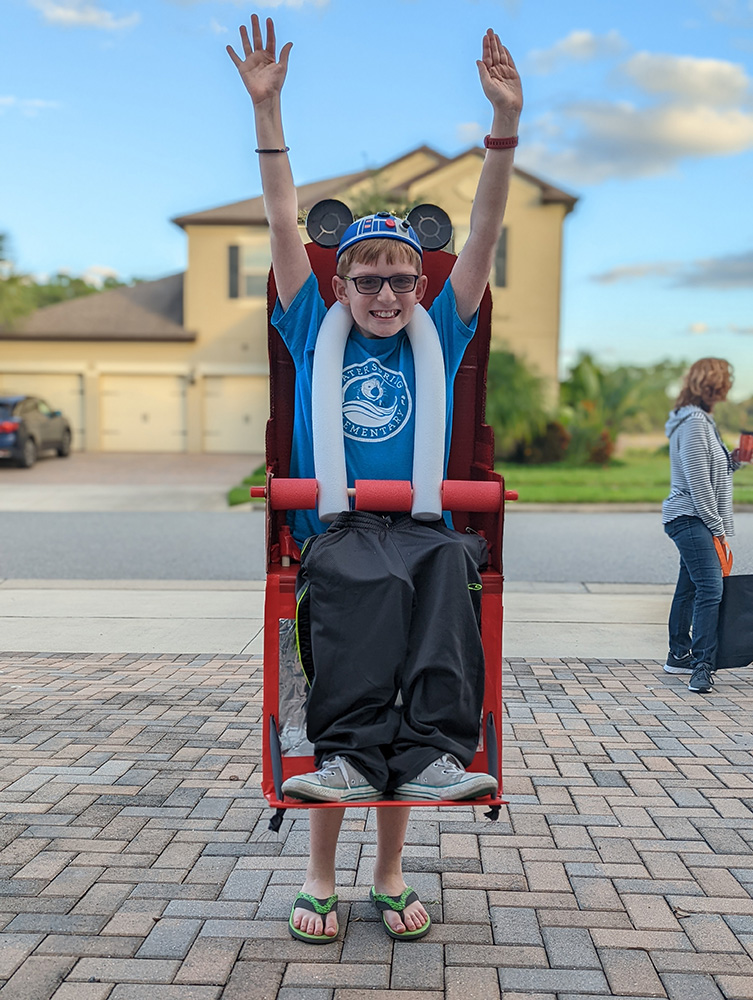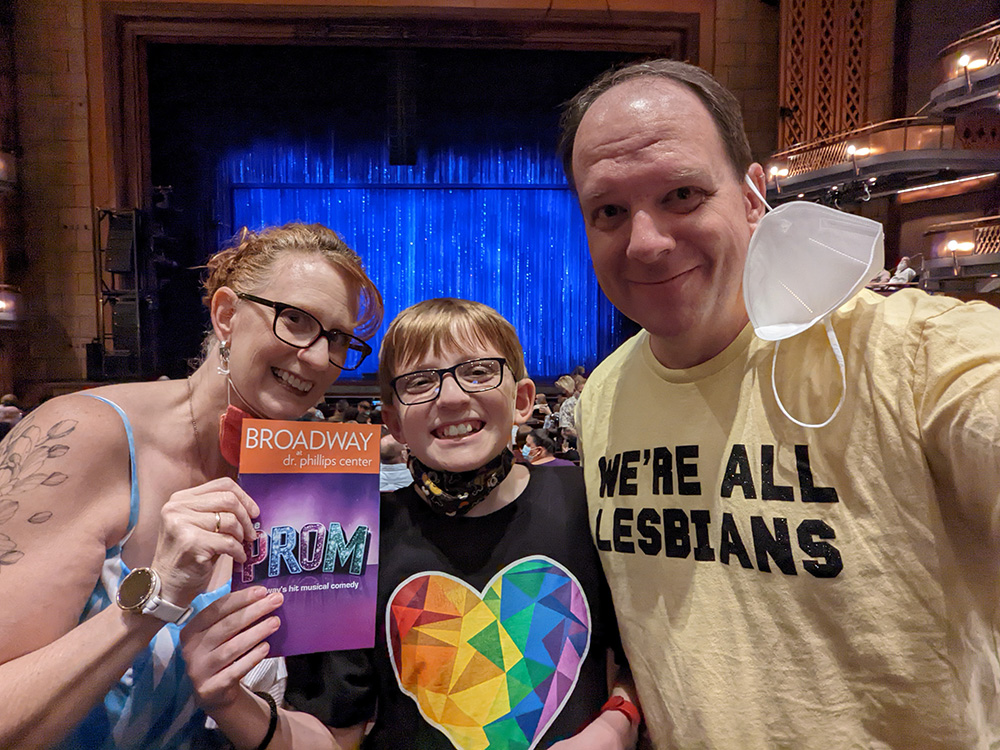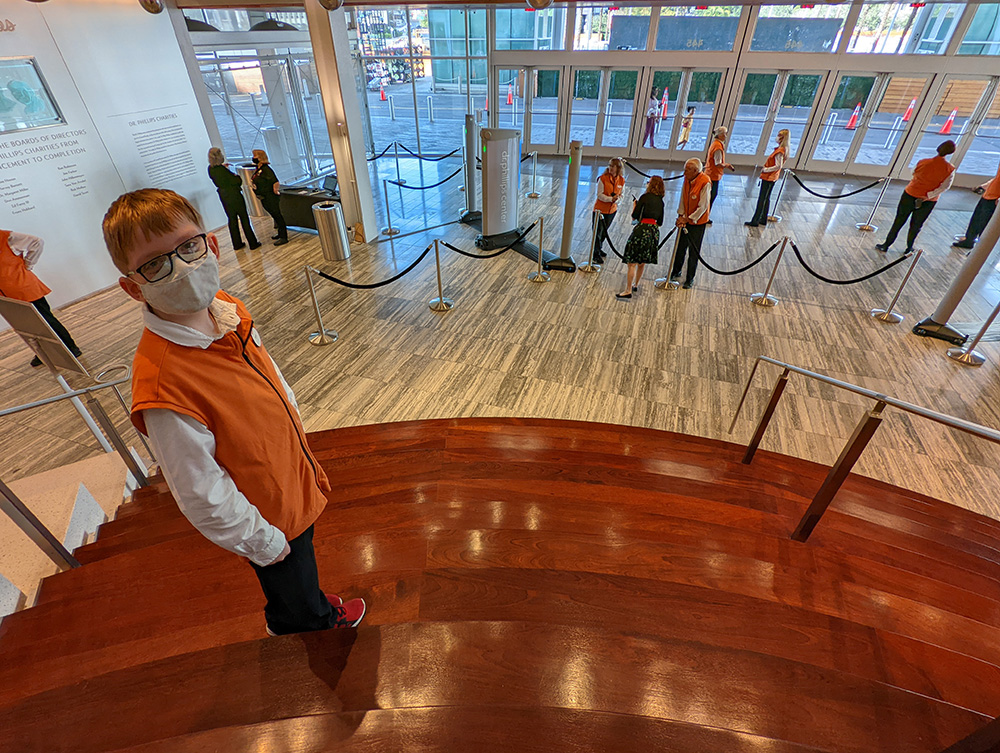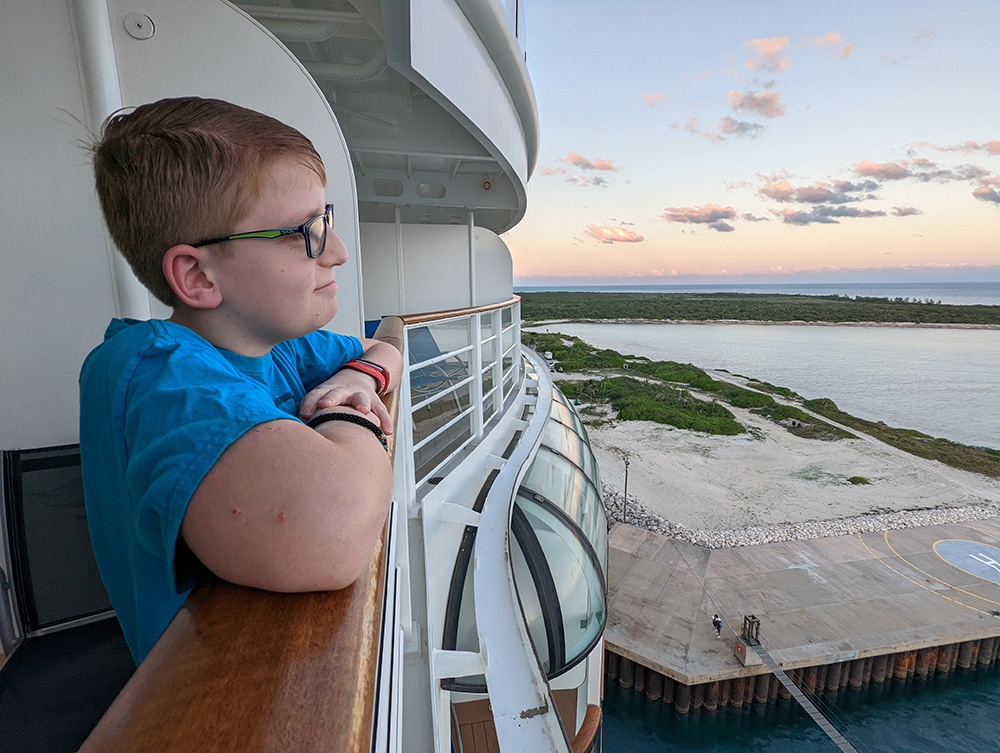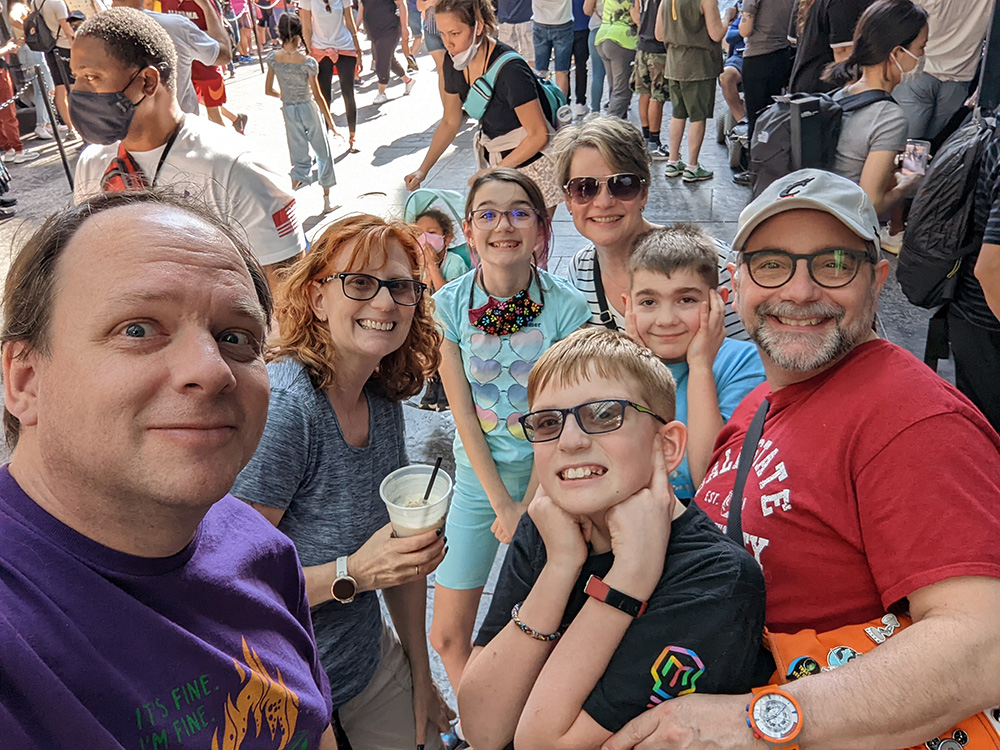Archive: March, 2022
More about those pills
posted by Jeff | Thursday, March 31, 2022, 5:10 PM | comments: 0Two weeks ago, I described my experience with depression and starting to take a medicine to hopefully help deal with it. About that time, my doctor doubled the dose. I was already seeing some changes, and a return of the feelings that make me, me. The transformation since then, however, has been extraordinary.
While I did feel like I was coming out of a fog two weeks ago, now I'm like me from... I'm not sure when. Diana described me as being more "driven," which I think sums it up well. I'm so not into riding the couch, and I want to do things. I've taken on a philanthropy project, I've been working a lot on that word game in my spare time, I'm more plugged in at work, I'm writing more, I banged out half a screenplay outline, and maybe most importantly, I'm (mostly) more patient with Simon.
I said last time that one of the biggest things that triggered this desire to explore medication was the absence of joy. Last night, we met up with friends before a show, and even though the show was terrible (it was Cats), it felt so amazing and great to be out at the theater and being social. It felt good to take in the downtown vibes, have my favorite lady next to me and know that I was looking forward to what I would do the next day. I suppose I didn't realize how absent these fundamental things were before.
Now, keep in mind that I still feel sadness. There's not a lot of positive things happening in the news lately, to understate the situation. In fact, I would say that even the sadness is more intense, but what's different is that it doesn't make me want to crawl under the bed and go to sleep.
As for the ADHD treatment, the off-label use of bupropion, that's a little more of a mixed bag. I find that sitting at my desk, I'm less likely to open six browser tabs for the purpose of wasting time. I have no desire to doom-scroll social media. With all of this focus though, I have revived the need to balance things out. You have to step away from things, take moments, relax, meditate and maybe even have a nap now and then. If I don't do that, I find myself tired and not at my best.
This all comes at a time when I'm already framing every action and feeling in a context that includes autism and ADHD. What I'm learning about myself is just how much work it is for me to adhere to the neurotypical social contracts and structures that we need to operate in the world. For example, eye contact with people I don't know really well is exhausting. I used to write that off as a character flaw, but now I know there's more to it than that. Also, the usual bits of how you interact with people, emphasizing kindness and encouragement and advocacy, I know that it's the typical way to interact with people, but I see in the moment now that it takes a hundred decisions in the moment to act that way. Everything I've learned about Simon having to develop compensation strategies, I now realize I have.
I can't really put into words how overwhelming all of this discovery is, and maybe realizing that I didn't understand myself very well. It's a strange realization to have at this point in life. It's humbling, because one thing that I like about being over 40 is that I feel I've accumulated a fair amount of useful wisdom. I suppose I still have that, but recognize that I won't ever be done (well, until I die, obviously). The important thing is that this drug really helps. For some reason that's surprising.
The surprising joy of play testing
posted by Jeff | Monday, March 28, 2022, 8:46 PM | comments: 0A few days ago I mentioned that I was building a word game. As I said, I'm doing this for the joy of it, and don't care that much if it's widely accepted or played. I'm also not saying that I buy into the hipster bullshit about game "purity" and not wanting to monetize it. You bet your ass I'd be happy to give it to someone for a million dollars. But just because it's a leisure project doesn't mean that I don't want it to have some craftsmanship and quality to it. To that end, I invited some friends to check it out, and that has been an education.
What I'm after isn't QA, not in the technical sense. I wanted to validate that there was something fun about the game, that people would actually want to play it. It turns out that all of my assumptions about the original rules to the game were wrong. I mean, the rules just didn't work at all. It was clear after just two people tried it. This turned out to be a good thing, because it immediately sparked conversations about what might be fun, and I started iterating from there. I still don't think it's there yet, but I'm collecting data to see how it goes.
To be sure, there are technical and mechanical things, too. I have to figure out how to accommodate color blindness, because one of my testers can't really see the difference between button colors. We found a case today where a tester expected that there should be a button to do something that's rare, but still valid. Again, my assumptions were wrong. And the average time to complete a game is 50 seconds, which seems too short.
Play testing is a huge topic and it's staggering how much there is about it out there. The fundamentals of it aren't that different between testing a Halo level and a board game, though the latter can involve a lot of research about the feel of the objects in the box. It's all a completely new world to me, and it's super fascinating. The coding part was "easy" by comparison.
You don't have to reconcile all of the contradictory things
posted by Jeff | Monday, March 28, 2022, 4:00 PM | comments: 0The Internet has a lot of opinions about last night's Oscars, where Will Smith smacked Chris Rock after a pretty terrible joke about his wife. I don't need to weigh in on that, but I do want to weigh in on the phenomenon where people try to rationalize contradictory things.
One of the things that I always get tripped up on, and that I see in my son as well, is that when we see things that in our understanding that we feel can't coexist, we struggle. When it's really bad, it leads to a meltdown, which I absolutely recall having as a child, and I've seen my kid have them. For example, when you do something wrong, there are consequences for that action, even if you apologize. Simon really struggles with this, because the social contract as he understands it is that an apology cancels out the misbehavior. Imagine believing something so inflexibly that you can't respond rationally. In this case, it's often useful to choose one of the contradictory things as acceptable.
You don't have to be affected by autism though to want to pick one thing out of a group of contradictory things, and this seems to drive literally everything in our culture now. It's always left or right, up or down, and there's never room for nuance. It's not a paradox when two things that seem contradictory are both correct. And yeah, that's where that whole thing with the Fresh Prince comes in. Rock was absolutely out of line and wrong for his joke about Jada. Smith was absolutely wrong to assault Rock. Smith was wrong for taking the light from Questlove and his well-deserved award. And he may have, at the same time, deserved the Best Actor award (I didn't see the movie, but I'll defer to others). He may have believed he was defending his family, but at the same time he could be exhibiting toxic masculinity. All of this can simultaneously be true.
I'll admit, this is the hardest part of critical thinking for me. We're often faced with irreconcilable observations, in which case we often fall back on our biases.
My warm Nest thermostat
posted by Jeff | Sunday, March 27, 2022, 1:51 PM | comments: 0I'm just going to put this out there because there are comments about it all over the Internet and not solutions. After our lightning hit, one of our Nest thermostats started reading about 6 to 8 degrees too warm. I pulled it off the base plate, and the base plate was warm to the touch. I put a forehead thermometer on it and it was reading 100 degrees. The back of the thermostat proper was definitely warm because of it.
Anyway, Google graciously offered to replace it and their safety team wants to get a look at it. Cool. So I install the replacement, and within an hour or so, it starts reading about 4 degrees higher. How do I know? Because I put the remote sensor from my office next to it, meaning they should read the same thing. This time, the base was room temperature, so it wasn't that.
I did see an anecdotal comment on the Interenets about the heat potentially coming from the Wi-Fi chip, but that seemed weird because I have two of these, and the upstairs one reads fine. On the other hand, I had to replace our mesh router because of the lightning hit, so it was definitely a new variable. In fact, the old system had plug-in access points that you just left right there on the wall, and there were access points under both of them. So I put one of the new access points next to it, and there was no change.
As a last-ditch effort to tease out a solution, I connected the thermostat to my guest Wi-Fi, which I set to only work on the 2.4 GHz band. What do you know, the temperature started reading correctly within an hour. For reasons I can't explain, being on the 5 GHz band was throwing off the temperature sensor inside. I can't explain why the other thermostat doesn't behave this way.
"Woke" and "cancelled" don't mean what you think they mean
posted by Jeff | Saturday, March 26, 2022, 11:45 AM | comments: 0A significant part of the white grievance movement is the assertion that the aggrieved are being systematically persecuted for what they believe, and their way of life is being threatened. Now, I'm not saying that I speak for all white, heterosexual, middle-age, American men with a healthy 401k, but from where I'm sitting, I can say with certainty that there are little to no cultural conditions that will prevent me from thriving. In fact, there never has been. Even having ASD, which has certainly made life more difficult, has not prevented me from achieving success in my career, fiscal standing and place in society. For the 30 to 50 years I have left, nothing will change that aside from climate change, and by then I can probably afford to buy my way out of difficulty there.
But you often hear people participating in white grievance that they're being "cancelled" by "woke" people for what they believe, or worse, for being white. Again, anecdotal observation here, but being white has not been a limitation for me, and it's not becoming more of a liability either. So if it's not about being white, maybe it's what you believe. Maybe it's what you say.
What you may consider being "cancelled" by a "woke" person is really just getting called out for a fundamental lack of basic empathy and human respect. Even Putin, not to mention our former president, insists that the victims are people “do not fit into modern templates, no matter how absurd they really are.” Here in the US, the "templates" appear to be people of color, LGBTQ folks, non-Christians, women, and their allies. These groups aren't looking for special treatment or an upper hand, they're only looking to be treated as equals, because they never have been in the history of our nation. The legacy of hate and legal discrimination have had a lasting effect on our society. Pretending that if we don't talk about it, mostly because it makes people uncomfortable, it will go away, is absurd. If you're being called out, I can assure you it's not for being a white, heterosexual, middle-age, American man, it's because you're being an asshole toward other human beings who pose no threat to your way of life.
In fact, no one wants me to feel bad for being a white, heterosexual, middle-age, American man. Literally no one. But what I have been asked to do by marginalized groups, for as long as I can remember, is try to see the world from another perspective. Talking about race makes you uncomfortable? Imagine how you would feel if you were Black, when your whole experience is predicated on the color of your skin, and that experience hasn't been great. Gaining and expressing empathy for people who are not like me does not come at my expense or change my standing in the world.
And honestly, I don't know what to do with the people who think that kids will "choose" to be gay or trans because they know about gay or trans people, or the folks who can't reconcile that George Washington was a great leader but morally on the wrong side by being a slave owner. You can't really reason with people who believe without evidence that there is a conspiracy by pedophiles to commit election fraud against the people they want elected. No one is trying to "cancel" those people, but they're certainly being called out for the actual harm that they create toward those who are not equal in the eyes of the law and our society.
White, heterosexual, middle-age, American man here. No one threatens my happiness or way of life.
I'm building a word game
posted by Jeff | Thursday, March 24, 2022, 8:15 PM | comments: 0Inspired by the Wordle phenomenon, which I suspect may be waning, I decided to build a word game myself. I've been going at it for a few hours every night this week, and I'm really having a good time with it. When I do put it out to the world, I don't know if it will get any attraction, and honestly it doesn't matter. It's the most fun I've had writing code since I wrote MLocker, which by the way I use every single day.
While I've written software most of my professional life, or in more recent years mostly managed software projects and people, I've always wanted to write a game, but couldn't think of any good ideas, and I wasn't sure where to start. The tools are pretty easy to come by these days, and there are a bunch of open source game engines, many leveraging the .NET stuff that I already know, able to run on all platforms. It's kind of a magical time in that sense. But going back to Wordle, the thing I loved most about it is that it's purely a web app. There's nothing to download; you just point your browser at it. I know how to build web apps, so doing a text-based game in a browser is particularly well suited to my existing skills.
I'm using Blazor again for this, because it's super easy to do front-end work with it, and since it's compiled to WebAssembly, it's harder to cheat. It's not hard to poke at Wordle with browser dev tools to get the answer (it took me maybe two minutes). In my case, I think I'm going to send your score back to the server, so the next day you can see how you did compared to the rest of the world. Definitely don't want cheating in that case. I dunno, I haven't thought that through very much.
I've been messing with some old school CSS stuff that I've largely ignored for years, specifically animation and flex layouts. They aren't hard to figure out, but getting to know the quirks and best practices has been interesting. Going back to something simple like CSS is a lot more fun than trying to understand IAM policies in AWS (and for the record I don't understand the latter at all).
Thinking about the game in terms of rules and overall gameplay has been fun as well. Once you come up with a basic premise, you have to start asking yourself what it means to win, if there should be time limits, scores, etc. I've put it in front of just a few friends for feedback, but with only one board to do, it's not very compelling at the moment. I think there's a lot there to experiment with still.
When will I release it to the world? I dunno. I imagine probably a few more weeks. The basic game is more or less done, but the part where you would compare your score to others would take an extra few days. I can probably make that optional or add it later.
Knowing you have ADHD
posted by Jeff | Saturday, March 19, 2022, 10:32 PM | comments: 0When I was diagnosed with autism spectrum disorder and ADHD last year, my immediate thought was, "Duh, of course." Even then I had some ideas about what it might mean going forward, but in the time since it has caused me to want to reframe my entire life. That context changes everything. I'm not even close to a point where I can reconcile it all. I've generally concentrated on the ASD part, but lately the ADHD part has become even more evident in daily life.
In my last post, I talked about taking medication for depression, and how bupropion XL has an off-label use to treat ADHD. Conceptually, the outcome is similar to the way amphetamines work, as they're often prescribed for ADHD. Those drugs increase dopamine levels in the brain, while bupropion is a reuptake inhibitor of dopamine (and serotonin and norepinephrine), the net result of both being that you've got more dopamine which is believed to allow your brain to better focus. Isn't neurochemistry fun? The big difference in these drugs is that amphetamines tend to work pretty quickly, but reuptake inhibitors can take many weeks to start having a noticeable effect. I'm six weeks in and just upped the dosage to the typical adult level of 300 mg, so while I definitely can feel the urge to ride the couch lifting, I'm super aware of my inconsistent ability to focus.
Tonight is a perfect example of this. I thought of an idea for a web-based word game that I want to develop (because Wordle, natch). For me to do this, there are a few newer technologies that I want to explore because I think they'll make it easier for me. So I go to read documentation, and I get about as far as a paragraph before I'm opening new tabs to doom scroll or see if Mark Rober posted a new video or literally anything other than reading the documentation. This is where the life reframing comes into play. Early in my career as a software developer, I did a lot of things "wrong" or couldn't understand more complex things because I though I was just too impatient to learn them. Now I realize that it was probably ADHD that inhibited my ability to focus.
I've seen people compare using ADHD meds to wearing glasses for the first time. The thing I'm on is more gradual, but I wonder if I'll have a similar experience.
These are the pills I want to talk about
posted by Jeff | Thursday, March 17, 2022, 7:30 PM | comments: 0When it comes to my health, the last year hasn't been bad, but it sure has changed things. I had my first colonoscopy and it was thankfully all good. Last summer, my labs came back with a number of concerns that my doctor wanted to fix. It started with hypothyroidism, which has been fixed with levothyroxine. My metabolism is where it should be now, though as a side effect, I seem to eat more, and alcohol oddly does not affect me. My cholesterol wouldn't balance out, so for that, she put me on rosuvastatin. Sure enough, it's where it should be. My triglycerides unfortunately stayed high, so she added ethyl eicosapentaenoic acid, derived from omega-3's, to the mix. That's about where it should be now, too.
By the end of last year, I started to realize that my mental health wasn't well. For a long time, I attributed this to a number of things, including pandemic fatigue, difficulty in parenting and at work, and weather. I was, for the most part, living on the couch. That wave of making stuff that I went through in the pandemic, with the radio show and all the software I made and Lego sets seemed to come to an abrupt halt. My curiosity about the world seemed to have faded.
Two things really made me realize that this wasn't just a temporary funk. The first was that when I got to see Joss Stone, a singer I've wanted to see for like 15 years, I didn't really feel much about it. Concerts used to be something I lived for. Similarly, seeing The Prom did not instill the joy that I expected, and I adore that show. Then, and this is going to sound slightly ridiculous, I saw a post from Sara Bareilles on Instagram where she revealed that she was taking an antidepressant and it was like rediscovering herself. Her assertion about feeling joy, that made me incredibly sad because I realized then that I was not experiencing joy.
Here's the thing... I've never felt suicidal or wanted to hurt myself. I see a therapist. And I suppose because my life is objectively "good" in terms of its financial and immediate social situation, there's nothing "wrong." But in a world where nothing sparks joy, there's a deeper problem.
The medications that my doctor put me on to fix all of those numbers definitely worked. There's no number though for where your head is at. And we're talking here about messing with your brain chemistry. That's the thing that makes you, you. I've dealt with this struggle once already because of the various medications that Simon has taken for ADHD (which I now understand I also have). But just as I felt strongly about making sure that Simon has access to therapy, that's why I've stuck with it in recent years. But I've become accepting of the fact that maybe therapy isn't enough. I take acetaminophen when I have a headache, so why is this so hard?
So on my last follow-up with my doctor, to get the results of my latest labs after the omega-3's (which included kidney function, yikes), I told her I didn't feel right, and I wanted to do something about it. I felt so defeated and sad about it, which seems like the wrong emotions.
My doctor put me on bupropion XL, an extended-release drug that works as a norepinephrine–dopamine reuptake inhibitor, which means there's more norepinephrine and dopamine hanging out, to facilitate neurotransmission. In other words, it's more possible to feel joy. Interestingly, while it's an off-label use, it can also curb the effects of ADHD, which is often treated by amphetamines which stimulate neurotransmission (if I'm reading the literature correctly).
Anyway, I've been on this drug for six weeks, and the expected range to have some effect from it is 4 to 6 weeks. I've experienced real joy, going to see Frozen with Simon (the stage musical). The other night I enjoyed going to Epcot with Diana and Simon, just being in the moment in the environment. In my spare time, I've started a new software project. I'm not content to just hang out on the couch. I think it's working, but unlike cholesterol, there's no number to measure to get an actual idea about how it's going. If it can in fact help with ADHD, I'm not yet seeing anything conclusive there. I still find myself bouncing from thing to thing.
But I was on the lowest dose, 150 mg, and it appears that 300 mg is the standard. The doctor bumped me to that, so now I have to see how it goes in another week or two. I've noticed a change, but it has been somewhat inconsistent. I find that I'm still easily irritated, and some days are better than others in terms of my couch-magnetism. Still, I keep having experiences where I'm surprised at my excitement and enthusiasm. I'm even pitching a volunteer project.
I'm irritated at myself for my long-term closure to any kind of drug therapy. I feel like it's another thing that has been culturally imprinted on me, that it's a shortcut or sign of weakness or some other bullshit. But I corrected all of those things that put my physical health at risk. It stands to reason that I should do the same thing for my mental health.
New router and wi-fi after lightning hit
posted by Jeff | Tuesday, March 15, 2022, 11:07 PM | comments: 0Last weekend's lightning hit fried the ethernet port on my router, and that makes me sad. Right before we moved into this house in late 2017, I bought a Ubiquity AmpliFi mesh router. The geeks with large houses were really excited about this particular system. It had this cool little cube of a router to plop on my desk, and two things that looked like cellular antennae that you just plugged right into the wall. at strategic locations to extend the signal everywhere. The result was pretty great wi-fi across the entire house on both floors. In retrospect, that was pretty great for a system based on the 2012 standards, and pretty much every device had no issue picking the best access point on the best band. We typically have more than 40 devices during the day talking to the network.
I still have the old TP-Link router that powered our last house, with all of its blinky lights and three antennae. It has two problem though, the first being that it obviously doesn't cover the bigger house. Our Ring doorbell, for example, is if I had to guess, at least 50 feet away with several walls in between, and it couldn't latch on. It also didn't have any magic to help devices connect to the right band, 5 GHz for speed, the 2.4 for distance. I know some people just provision each with different SSID's, but that seems silly. The machines should just figure it out.
I could buy a replacement AmpliFi without the two access points, but the best price was $180. I think the original package was $300, so I suppose that's not out of line. But there are many mesh router choices now, and most also have the new wi-fi 6 standard available, which is impractically faster, but perhaps still more robust. I settled on the TP-Link Deco X20 system. It was only $220, had mostly positive reviews, and it was certainly an upgrade.
While I preferred the way the extra access points just plugged in anywhere on the old system, the new one has the very cool advantage that every node could act as the main router, in the event that one of them dies or gets fried by lightning. The other cool thing is that it has better backhaul options, which is the link between each node. They use a separate channel from the regular channel that your devices use, in order to connect. And if you can run ethernet cable between them, and I happen to have an otherwise useless network in my house between four locations, you can use that as the backhaul. This means it would be slightly more stable and less latent for the devices on that node, which is important for Simon for gaming. We never had an issue before, but it's still pretty cool.
Overall, measuring the signal (there's an app for that), it's far better everywhere, and most of the devices connect on the 5 GHz band, likely never to use that available bandwidth. I'm pretty happy with it, and the app also has the parental controls to turn off devices at bedtime. It even tracks what domains that device hits.
Lightning does strike twice, literally
posted by Jeff | Sunday, March 13, 2022, 12:34 AM | comments: 0A crazy storm rolled up out of nowhere this morning. I knew we would see a 40-degree temperature swing today, so I expected it to be mostly just windy, but it had some crazy lightning. And wouldn't you know it, while I was in the shower, it struck somewhere near the house, approximately the same way that it did a few years ago. So that old saying that lightning never strikes twice is apparently not true.
Once again, it took out our Internet connection. There was a wider problem with the equipment down the street that knocked out a bunch of houses, but a guy came out and fixed that and confirmed the fiber to our houses was working. Unfortunately, again, the little transformer that powers the fiber to coax converter got blown out, so I had to wait for a dude to come and replace that. This time, the converter itself seemed to survive the hit.
My router was not so lucky. The ethernet port that connects to the modem got fried. When we moved into this place I bought a fancy mesh router from Ubiquity, because I knew it was the only way we would get a good signal throughout the larger house. Those things were expensive back in the day, and this one had a little screen on the front that showed some interesting things like your spontaneous bandwidth usage. It's not the first router I've had die from lightning, the previous one being an Apple AirPort back in 2017. Lightning has a way of getting around surge protectors when it's coming in through Internet cables. I have a backup router, the thing I used to replace the Apple, but I was never crazy about it, and it definitely doesn't reach very far into this house. So I ordered a new one that will be here in the morning. That replacement will be kind of neat because any of the nodes can act as the main router, and they can connect via the ethernet I have in the house meaning it won't be the wireless relay style mesh systems otherwise have to use.
The really messed up thing is that the lightning did something to our power plant. At the center of the solar and battery system is something called a gateway. Basically it does the switching to kick in the battery when the grid goes down, and in the process, fully disconnects the house from the grid. It has to do this because under normal circumstances, the solar is usually putting its excess power back on the grid, which would be bad if there are people working on it. When the lightning hit, it knocked out our power completely. I could see that the battery wasn't talking to the gateway (it flashes a light), so that was bad. But the grid wasn't down, because all of our high voltage stuff, the oven, air conditioners and stuff, are basically on a separate system from everything else, and they had power. (The battery is only big enough to power the usual stuff like lights and the fridge in an outage.) I wasn't sure what to do, so I threw the big red switch that disconnects the power plant from the house entirely. That's a code requirement, apparently so a firefighter can make sure it isn't feeding power in when they don't want it to. When I threw it, all of our stuff came back on. When I put it back, it all went off. At this point, I remembered that the gateway has a reset button, so I tried that. I could hear some relays clicking in it, and it appeared we were back to normal.
But we weren't. One of the solar inverters was not synchronizing with the grid. The app said we were off the grid and on it at the same time. And then I noticed after sundown that we are apparently running off the battery. There's a total reset process for it all that means resetting and shutting everything down, but I'm not going to mess with that in the middle of a cold night. That'll be my first task in the morning.
What to do with war
posted by Jeff | Friday, March 11, 2022, 6:24 PM | comments: 0The Russian invasion of Ukraine is a sad and horrible thing. I don't have any coherent thoughts about it, just observations and connections.
I've worked with a number of Ukrainian immigrants over the years. I even worked with an off-shore software team from there, and they were pretty good at what they did. Kyiv isn't an abstract place to me, as I had video calls with them, at their office and in their homes. One of their leads even visited us in Orlando and brought us chocolate. Ukraine isn't a place on the map to me, it's people that I've known.
One of those former coworkers, who has permanent resident status here now, has reposted awful things on social media. They're scenes that look like they're from a war movie. She says she doesn't know if she'll ever have her mother's cooking again. Her hate for Russians is intense. Her frustration that the rest of Europe has not come to their aid is justified. The only thing that I can think of is the way I would feel if someone invaded Ohio. It's heartbreaking and terrible.
If you're my age or older, you grew up with the Soviet Union and the cold war, and the Russians being the "bad guy" is nothing new. But after decades of diplomacy and de-escalation following the breakup of the Soviet Union, we're in an unimaginable place. The experts game this out, and there's no good outcome for Putin. Russian mothers are receiving their sons in boxes, if they're even brought back at all. Their economy is being obliterated not just by western governments, but countless corporations and individual behavior. All of this hardship comes down to the decisions of one man. I don't know that any wave of nationalistic feeling can overcome that.
Two million people have fled Ukraine, and even if they are able to return to their country, what will be left of it? I'm glad that people are paying attention to this, but it's also frustrating that it's partly because it's a European nation. Over the years we've seen millions collectively flee Syria, Sudan, Afghanistan and a number of countries in Central America, without much bother. I've gotten to know refugees from Syria and Kuwait pretty well, and both are American citizens now. Hearing their stories, I can't even imagine what it would be like.
The economy is global, there's no getting around it. This will affect our economy. It's already messing with energy costs. As is now custom for Americans, we don't seem interested in understanding it, we're just looking for someone to blame. It doesn't occur to some people that the only to blame is Putin.
We're just emerging from the pandemic (mostly), and now this. There's nothing I can do about it, but sometimes it feels icky just to have the privilege of it not affecting me directly. You can't solve every problem or even impact it, but it makes me grateful for the birth lottery I won.
That's my brain dump on the war for now.
Tears For Fears came back in an impossible way
posted by Jeff | Wednesday, March 9, 2022, 8:00 PM | comments: 0Last year I made an unusual post about how enamored I was with Wolf Alice's Blue Weekend album. Indeed, some of my fascination was that it was an entire album of good music, which is rare these days in the hit-driven streaming world. It may be a generational thing, but I love when an entire body of work is contained like that by a single artist. There were a number of great albums that I just listened to constantly growing up. I'm not particularly nostalgic, as I complained about the relative lack of good music last year, but there are definitely things that represented a time and place. U2's Achtung Baby, R.E.M.'s Life's Rich Pageant and Out Of Time, the debut from Garbage, Smashing Pumpkin's Siamese Dream, all of the Supreme Beings of Leisure albums, Tracy Bonham's Blink The Brightest, The Naked And Famous' In Rolling Waves, Grouplove's Spreading Rumours... I could go on.
In high school, a very special album came out from Tears For Fears called The Seeds of Love. That was 1989, and it was anxiously awaited after the enormously great Songs from the Big Chair four years earlier. It was critically and commercially a big deal, and I got to see them live around that time. It's one of a very small number of albums that I still manage to listen to with some frequency from that time. They brought on gospel and soul singer Oleta Adams for that album, which added a completely fantastic layer to the music, especially on the piano. "Badman's Song" is so good, and a joy to see live.
The principal band members, Roland Orzabal and Curt Smith, had a falling out after that. Roland recorded two albums under the name with different people that never had any real traction. In 2004, they reunited for Everybody Loves a Happy Ending, but it too had little success. I've heard bits of it and it didn't grab me.
But then during the pandemic, Curt Smith and his daughter had a viral moment with a cover of their classic "Mad World," and around that time he said that he and Roland were working on new stuff. As they've said in countless interviews in the last few weeks, they rebooted after record execs encouraged them to write some hit singles with various outside writers, and they weren't happy with the result. As one of them said, they think of music in terms of albums, and even "sides" (you know, of vinyl or cassettes).
The Tipping Point is extraordinary. That's saying something given the impossible expectations that virtually anyone would have of them, especially given the relative failure to launch since Seeds of Love. It doesn't help that nostalgia tours are all the rage, and all of these bands from the 80's and 90's are playing the same old shit they've been playing for 30 years. Given the economics of the music business these days, music supports the tour, not the other way around as it used to be. Still, they managed to put 10 songs together that are a bona fide body of work. It sounds like them, but it's new. It sounds like an album written by a couple of guys who have seen their share of life, including the death of Roland's wife a few years ago. There aren't any bad songs here.
The singles so far, "Break The Man," "The Tipping Point" and "No Small Things" are definitely among the stronger songs, but "Long, Long, Long Time" sticks out, and "Rivers of Mercy" is that song that you've needed to help reconcile all the shit in your life. It's so good.
Music has a way of stepping in at particularly difficult times. I'm grateful for this bit landing right now. I look forward to seeing the band live in May, along with Garbage.
Energy costs
posted by Jeff | Wednesday, March 9, 2022, 2:00 PM | comments: 0With the Russian invasion of Ukraine (about which I can't write anything remotely cohesive yet), there is understandably some pressure on energy prices, which Americans can already see in the spike with gas prices. You can also see a lot of hyperbole and misunderstanding about how the economics of energy, especially how oil works.
It's unfortunately predictable. The right blames Biden, despite the fact that presidents can't, and never have been able to, appreciably affect gas prices. The left blames "greedy" oil companies. Neither is correct. Oil is a globally traded commodity that is produced all over the place and consumed all over the place. The US roughly exports as much oil as it imports, but of course as demand and supply can be dynamic, oil companies can't just keep what they have here sitting around. That's also why "banning" Russian oil is largely symbolic, because you can't completely control where the stuff comes from. The price isn't simply set domestically. If Chinese demand increases, the price goes up globally. It's fundamentally supply and demand, and I'm surprised at how many people don't understand that.
The real problem is the reliance on fossil fuels in general, because they come out of the ground, and it's often not ground that you own. It's terrible for the environment of course, but once again, it's not like we don't have a solution for this problem. Renewables now cost less than the fossil fuels, and building new facilities to generate that power, it's not even close. Renewables are a solved problem, there just has to be the will to use them, which puts incumbent energy businesses at risk. The model of distributed electricity generation and storage is also more robust and less prone to failure.
Fully two-thirds of our energy use comes from the sun, including the power to operate our cars. Imagine if my neighborhood had its own solar plant and storage installed over one of the otherwise empty retention basins. Or if the utility installed more large-scale solar and storage. Other areas could benefit from on or off-shore wind. Much of the Pacific Northwest already runs on hyrdo. There is low-cost energy all over the world, right now. We shouldn't be stuck relying on fossil fuels. If you're serious about demanding "energy independence," a still nebulous idea if the equipment is manufactured globally, then renewables are the only logical way to go.
Simon, 12
posted by Jeff | Saturday, March 5, 2022, 10:44 AM | comments: 0We're only a year away from having a teenager now, and that's horrifying. I feel like we just got through potty training and first grade. For all of the difficulties we've experienced as parents, it's also true that he's come so far in a relatively short amount of time.
In many ways, this last year has been one of returning to something normal-ish, along with some wins and losses in his new school. He has established friendships for the first time and we see him making social progress, but his school has been disappointing in terms of academics. He's deeply emotional, but gradually developing self-awareness. His impulsivity is serious, and we're working on that.
These photos remind me that for all of the hard things, Simon does experience a lot of joy in his life. Maybe he doesn't appreciate how much he won the birth lottery, but we're working on that too. We had more laughs this year than last, which is admittedly a low bar given the pandemic. This next year will involve more changes, as we revert back to public schools, and he will physically start to change because of puberty. What a time!
Once Diana and I were vaccinated, we returned to the theme parks with our passes to Walt Disney World. First up was a stop at Blizzard Beach, which was operating at a fraction of capacity. We had such a good time.
The ragdolls at this point were still only about a year old, but they're huge. Finn in particular has been tolerant of Simon grabbing him, but he's not one to skip out on the belly rubs.
Among normal activities was the ability to see family again. We spent a weekend at Papa's house, seeing him in person for the first time in two years.
With the parks not running at full capacity, there were some interesting opportunities. In this case, Simon got to do about four laps in a row on Expedition Everest at Animal Kingdom. This was the last one, as they closed the queue, and he was one of only three people in the train.
Not only did Simon try out blue hair for a bit, but he also tried out fruity non-alcoholic drinks at the parks and food festivals. This was at the Nomad Lounge in Animal Kingdom, one of our favorite spots to relax.
I bought a new camera this year, which seemed like a good excuse to do a little family photo shoot.
It really shouldn't surprise anyone that he was a roller coaster for Halloween.
We made our triumphant return to the theater this year, and we added Simon to two shows. This was The Prom, which he knows well because we've been playing the cast recording since seeing it on Broadway in 2019. Today for his birthday he gets to see Frozen.
We've turned that fascination with elevators into a volunteering opportunity. The Dr. Phillips Center for The Performing Arts is a big part of our family, since Diana works there and we're founding donors. As the "elevator captain," Simon directs people to the right door to be seated.
I have made a lot of photos like this one on the various cruise ships, and in the first one, he was standing on the table with his chin on the rail. Now he's approaching Diana's height. We did our first cruise in two years in December, and it felt so good to be back.
Just a few weeks ago, the Seattle Mattoni cousins were all reunited for the first time in two years. Simon has been playing games online with Mason for much of the last year, but it's great to finally get them together in the same place.
Between enablement and constraint
posted by Jeff | Wednesday, March 2, 2022, 8:10 PM | comments: 0I spend time thinking about what it means to be creative. We value creativity in our culture, I suppose because it is in part a means to problem solving. Making things is enjoyable. Developing something, or even people, is exciting. Often in education, as it results to our boy, we think about the balance between accommodation and accountability, the squishy area where you want to enable him for success but ultimately leave it up to him. Another way to look at is to find the line between enablement and constraint. Jack White made the point in the documentary It Might Get Loud that constraints are a powerful means to facilitate creativity, whether it's painting with only two colors or playing music with one less guitar string. Robert Rodriguez has made a career talking about making movies with no money.
While we're on the subject or parenting, I have admittedly been letting Simon just kind of flail lately, leaving him to figure stuff out. I've come to realize that there are a lot of things that you can do for your kid that may contribute to his development in one way, but limit it in others. For example, you could leave out the things you need to make a sandwich, but then you deny him the opportunity to figure out how to gather things and plan it out (silly and trivial example, but you get the idea). I think about this in my own childhood, and I didn't have a lot of "stuff," but I sure could make things if I had some cardboard and my Erector set. Simon was the same way when he was little, as he would fill in the blanks on virtually everything he was interested in with blocks. In that sense, the constraints of not having some arbitrary toys forced him to figure things out.
There's a balance like this in software. In the days of managed code and open source software, the job is often more one of composition than invention, and that's OK. But it can go too far. Some of the more famous vulnerabilities in recent years came from using very small open source libraries that did things that wouldn't be that hard or time consuming to do yourself. The shortcut may have enabled the developer, but they may have missed out on some opportunity to learn or arrive at a creative solution.
The stuff that we buy may feel enabling, but after moving six times in eight years, mostly it just weighs you down. I wish I could have learned that earlier in life. I'm dangerously close to another "experiences not stuff" tangent, so I'll leave it there. But I think more carefully about buying things. I'm not saying you shouldn't if it enables something greater. You'll not likely find anyone who ever felt that buying an upright mixer for the kitchen was a bad idea. But there's a small appliance for literally everything now, and you probably don't need it. I mean, bread makers, panini presses, omelet makers... really? The fun thing about cooking is learning how to make stuff with what you have, to enjoy the process.
When I talk this out, I think what I'm really after is that constraints are good if they force you to be creative and exercise your brain. We shouldn't always take shortcuts. That doesn't mean that we shouldn't take advantage of technology, but I worry that we try to make everything easy, and that may turn us into the people in the movie Wall-E... overweight, oblivious and lazy. That doesn't seem like a satisfying way to exist.
